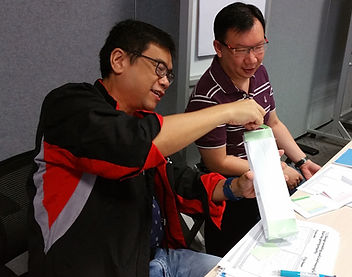
DESIGN THINKING
workshop
Solve the Right Problems. Design Human-Centered Solutions
That Work.
Description
Design Thinking is a human-centered, iterative approach to problem-solving that fosters creativity, collaboration, and innovation. Rooted in empathy and experimentation, it empowers individuals and teams to deeply understand user needs, reframe challenges, and co-create impactful solutions.
As part of our Design Thinking Framework, this course equips participants with a practical framework to drive innovation, improve customer experience, and tackle complex business problems. Through hands-on exercises, real-world case studies, and guided team projects, participants will experience the full Design Thinking process from empathy to testing. Whether applied to product development, services, systems, or processes, Design Thinking helps unlock fresh insights and transform ideas into results.

Recommended Audience
Ideal for cross-functional teams, managers, innovation leads, HR, customer experience, product development, and professionals seeking to drive creative problem-solving and user-centric innovation.
Methodology

This course uses:
-
Hands-on team-based learning and simulations
-
Practical toolkits and visual templates
-
Design sprints applied to participant-selected challenges
-
Facilitated feedback and coaching
Learning Objectives

By the end of this course, participants will be able to:
-
Understand the mindset, principles, and value of Design Thinking.
-
Apply the 5-stage Design Thinking process to real-world challenges.
-
Use tools such as empathy mapping, personas, journey mapping, and ideation techniques.
-
Rapidly prototype and test ideas for iterative learning and improvement.
-
Facilitate collaborative innovation and user-driven problem-solving.
Workshop Outline
Session 1: Introduction to Design Thinking
-
What is Design Thinking and Why It Matters
-
Principles and Mindset: Empathy, Iteration, and Co-Creation
-
Design Thinking vs. Traditional Problem Solving
-
Case Studies: Innovation Through Design Thinking
Session 2: Empathize – Understanding People and Context
-
User Research Methods: Interviews, Observation, Shadowing
-
Empathy Maps and Personas
-
Identifying Pain Points and Unmet Needs
-
Activity: Conducting a Mini Empathy Interview
Session 3: Define – Framing the Right Problem
-
Synthesizing Insights and Identifying Patterns
-
Crafting Clear, Human-Centered Problem Statements (POVs)
-
“How Might We” Questions to Spark Innovation
-
Activity: Reframing Challenges
Session 4: Ideate – Generating Breakthrough Ideas
-
Divergent and Convergent Thinking
-
Brainstorming and Creative Techniques
-
Prioritization Map, Affinity Map and Ideas Evaluation Matrix
-
Activity: Idea Generation and Clustering
Session 5: Prototype – Bringing Ideas to Life
-
Prototyping Principles and Low-Fidelity Tools
-
Types of Prototypes: Physical, Digital, Roleplay
-
Creating Rapid Experiments to Test Assumptions
-
Activity: Building and Presenting a Prototype
Session 6: Test – Learning Through Feedback
-
User Testing Techniques and Feedback Capture
-
Iterating Based on Insights
-
Validating Value and Feasibility Early
-
Activity: Conducting a Prototype Test
Session 7: Embedding Design Thinking in Your Organization
-
Applying Design Thinking Beyond Products: Processes, Services, and Culture
-
Building Cross-Functional Collaboration
-
Strategies to Scale and Sustain Innovation
-
Next Steps: Action Planning and Internal Projects
Award of Certificate
Certificate of Attendance will be issued to participants who have attended at least 75% of the workshop
Duration
One-day and two-day programs are available




